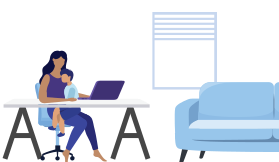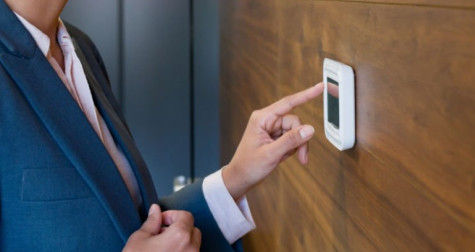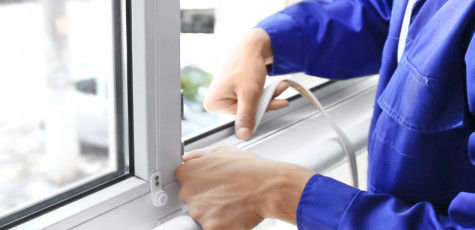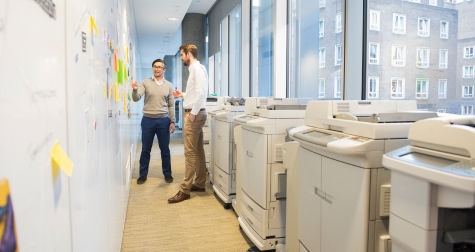Summer
Keep Your Business Energized Through the Hottest Days
In Michigan, seasonal weather impacts your company’s energy usage. A couple of hot days can increase your energy use and bill. Start saving on your bottom line today with quick and easy tips to help your business use less energy.
4 Factors That Impact Summer Bills
(Hover Over Icons)

1. Energy Usage in Your Business Space

2. Fluctuation in Workspace Temps

3. Changes in the Workplace

4. Monthly Billing Cycle for Businesses
1. Energy Usage in Your Business Space
Your building’s thermostat settings can cut into your yearly profits. Raise the temperature slightly during off-business hours in warmer months and save on your company’s energy costs.
2. Fluctuation in Workspace Temps
Drastic temperature spikes result in your building working overtime to keep your staff cool and productive — which affects your company’s energy usage and costs.
3. Changes in the Workplace
More people in the office often means more lights, air conditioning and personal fans are being used. An energy-efficient cooling system can save you a bundle — and keep your staff comfortable and productive.
4. Monthly Billing Cycle for Businesses
Cycles can run from 26 to 35 days, so monthly bills may vary. Note that there is sometimes a four-day difference in monthly billing cycles, which can cause your bill to increase.
Safeguard Your Business This Summer
Safety is always our number one priority.

Downed Power Lines & Tree Safety
You need to be mindful of the power lines and trees situated on and around company property. Practice safe protocols when having routine landscaping conducted or dealing with downed power lines.
If wires come down on company property, always assume they’re live and keep everyone at least 20 feet away. Report the problem to us online or call us at (800) 477-4747. If it’s an emergency,
call 9-1-1 immediately.
If you plan to trim trees near any power lines, we urge you to consult a professional tree-trimming service. Pole-to-pole overhead power lines carry high-voltage electricity that can seriously or fatally injure you.

Practice Plug Safety
Inspect your building’s outlets and electrical plugs periodically for a safe work environment.
Make sure tools, appliances and lights are approved for outdoor use at your place of business. Outdoor tools and appliances should have heavier wiring, special insulation and a three-prong, grounded plug.
When hanging lights around company property, be sure to survey the area for overhead power lines and maintain at least a 10-foot distance.
Keep all electrical connections off the ground and hang sockets downward to prevent water from seeping into them.
Don’t run electrical cords through door or window openings where they can be damaged.
For added protection, plug outdoor lights into circuits protected by ground fault circuit interrupters (GFCIs).
Invest In Your Bottom Line
Managing building repairs and purchasing energy-efficient equipment, electronics, and lighting can deliver year-over-year savings for your business.
Manage Your Company's Energy Bill
Summer
Keep Energy Usage & Costs Down When Temperatures Drop
Practical Tips for an Energy-Efficient Summer
Frequently-Asked Cooling Questions
Contact our Business Center directly by calling (855) DTE-4BIZ or (855) 383-4249 with any questions or if you need help paying your monthly energy bill. You can also call our Business Energy Consultation Line at (855) 234-7335 to schedule an energy audit for your business.
We have many convenient payment programs available for small business owners. Our Flexible Due Date service lets you choose your bill’s monthly due date between the 1st and 28th day of the month.
Payment Agreement gives eligible commercial business partners the option to make installment payments on an active account over a specific period, including any current charges. Shutoff Protection Plan (SPP) for nonprofit organizations is a year-round payment program designed to assist nonprofit business partners who are falling behind on their bills. Call our Business Center at (855) 353-4249 if you need help paying your monthly energy bills.
Yes. If your business uses a gas furnace for heating, the only electrical cost will be what is required to operate the fan motor and igniter. The igniter lights the flame for a moment when the furnace starts up.
Generally, in the winter, you should adjust your workplace thermostat by about 7-10 degrees to around 55° Fahrenheit. This temperature is a good middle ground to keep pipes from freezing while also conserving energy.
During the summer, when nobody’s in the building, consider raising the temperature about 5 degrees. If you normally keep it at 75°, increasing it to 80° can result in energy savings. And consider hanging solar shades or window coverings to reduce radiant heat absorption.





